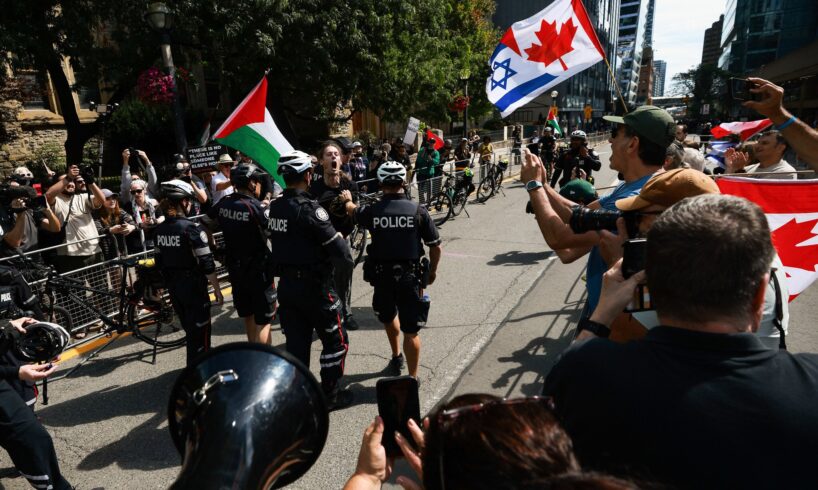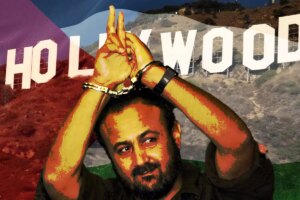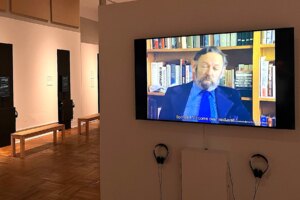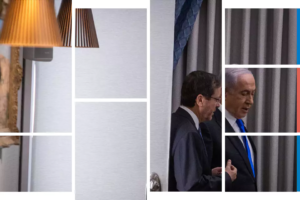
TORONTO — At 12:30 on Wednesday afternoon, a small but loud contingent of anti-Israel protesters appeared in front of Roy Thomson Hall in downtown Toronto’s entertainment district. Armed with signs, flags and a loudspeaker, many had their faces covered.
They were there to protest the world premiere at the Toronto International Film Festival of “The Road Between Us: The Ultimate Rescue,” a documentary about how retired IDF Maj. Gen. Noam Tibon saved his family and others during the October 7, 2023, Hamas-led massacre in southern Israel. Some 1,200 people in Israel were slaughtered and 251 kidnapped to the Gaza Strip during the onslaught.
Toronto’s finest were out in force, with about 50 officers deployed outside, and had separated the protesters from several Israel supporters — who waved Israeli and Canadian flags, and whose faces were not covered — placing the two groups on opposite sides of the street.
Inside the theater, additional police officers were on patrol, and extra security measures that the festival organizers had in place ended up delaying the film’s start by about 20 minutes.
At the prestigious Toronto festival, it’s usually the famous actors who get the biggest applause when they take the stage after a showing of one of their films. But at Wednesday’s screening, the stars of the show were husband and wife Noam Tibon and Gali Mir-Tibon, who had arrived from Israel for the occasion.
Get The Times of Israel’s Daily Edition
by email and never miss our top stories
By signing up, you agree to the terms
Following the sold-out screening at the festival’s largest venue, the Tibons received a thunderous, nearly five-minute standing ovation from the 1,800-strong audience as the dozens of protesters bellowed outside the building.
Flanked by Canadian director and documentary filmmaker Barry Avrich, who had made the film, along with producer Mark Shelby, the Tibons were interviewed by veteran Canadian journalist Lisa LaFlamme about the making of the film and its controversy-plagued journey to the festival stage.
Retired Israeli Maj. Gen. Noam Tibon and his wife Gali Mir-Tibon attend the premiere of ‘The Road Between Us: The Ultimate Rescue,’ at Roy Thomson Hall during the Toronto International Film Festival in Toronto, on September 10, 2025. (Photo by Cole BURSTON / AFP)
The screening was far from a given. The festival stirred controversy last month when its organizers rescinded their invitation for the documentary’s showing, citing copyright concerns over the use of bodycam footage of the October 7 carnage filmed by the terrorists who had perpetrated it.
A TIFF spokesman also told Deadline that the film’s screening was nixed because it had failed to meet “conditions that were requested when the film was initially invited” that were intended to “manage and mitigate anticipated and known risks around the screening of a film about highly sensitive subject matter, including potential threat of significant disruption.”
The cancellation provoked a massive outcry among people in the entertainment industry, Jewish and non-Jewish, over the censorship of this compelling Israeli story. A petition with more than 1,000 signatures, including from leading showbiz figures, eventually convinced TIFF CEO Cameron Bailey to reinstate the film.
Illustrative: Toronto International Film Festival CEO Cameron Bailey speaks during the 2025 Canada’s Walk Of Fame Induction Gala held at Metro Toronto Convention Centre on June 14, 2025, in Toronto, Ontario. (Jeremy Chan/Getty Images/AFP)
Bailey took the stage alone before the premiere and apologized to the Jewish community for what had happened, also acknowledging it was at a time of rising anti-semitism in Canada. His remarks to the largely Jewish audience were received with applause.
The plot thickens
Telling the story in real time from the couple’s point of view, the main action of the 96-minute film begins on the fateful morning of October 7, 2023, when the Tibons emerged from their daily swim in the Mediterranean Sea off the coast of Tel Aviv.
The clock starts ticking when Noam Tibon receives an urgent text from his son Amir, a journalist at the Hebrew daily Haaretz. Amir, who lived with his wife and two young daughters on Kibbutz Nahal Oz near the Gaza border, wrote his father that Palestinian terrorists were inside their kibbutz.
IDF troops walk through Kibbutz Nahal Oz, near the Gaza border, on October 20, 2023, following the October 7 Hamas onslaught. (Yonatan Sindel/Flash90)
Noam and Gali didn’t hesitate. Noam grabbed his gun, and the couple jumped into their car and bravely drove south as the Hamas-led invasion unfolded. After saving the lives of two Nova festival survivors and a badly wounded IDF soldier, Noam joined the battle, killed a number of Hamas terrorists, and, with the help of several IDF soldiers, ultimately saved his family. More than 60 IDF soldiers and 15 civilians were murdered in Kibbutz Nahal Oz and an adjacent military base.
The story is well known in Israel and abroad, thanks in part to Amir’s book, “The Gates of Gaza,” published last year, and has been featured widely on the news, including in the United States, where Noam appeared on “NBC Dateline” and “60 Minutes.” It has also been the subject of numerous newspaper articles and podcast interviews — but never has it been filmed in such a graphic and compelling manner.
In the documentary, the Tibons begin the account of that dark day from their house in Tel Aviv. The filmmakers then travel with the couple on the torturous route they took, hearing how, despite the presence of thousands of terrorists in the region, Noam and a small group of soldiers finally arrived at the kibbutz and rescued his traumatized family along with 400 other kibbutz residents.
Director Barry Avrich attends the premiere of his documentary ‘The Road Between Us: The Ultimate Rescue,’ at Roy Thomson Hall during the Toronto International Film Festival in Toronto, on September 10, 2025. (Photo by Cole BURSTON / AFP)
“We filmed it in real time to retrace their steps that day,” director Avrich told the rapt audience during the question-and-answer period after the showing, “because we wanted to ensure that the story was from their perspective.”
And it is. Punctuated by time stamps, texts, and dramatic film footage of that day, the documentary has a powerful sense of tension and immediacy. It also captures the shock the Tibons felt that day when the unthinkable happened — Israel was invaded and caught ill-prepared.
It was clear, under LaFlamme’s questioning, that the shock lingers for the two heroes. When she asked Noam how it felt returning step by step to all the places that he had been on that most horrific day, he paused, his emotions clearly visible before he described how difficult it had been. Asked about her reaction to seeing the film, Gali replied, “I still don’t believe it happened to us.”
Demonstrators rally in front of Roy Thomson Hall, where the documentary ‘The Road Between Us: The Ultimate Rescue’ was set to premiere at the Toronto International Film Festival in Toronto, Canada, on September 10, 2025. (Photo by Cole BURSTON / AFP)
Instead of using an Israeli filmmaker to tell their story for the first time, the Tibons chose Montreal-born Avrich, an experienced documentary maker well known for his many films including “The Last Mogul, The Life and Times of Lew Wasserman,” “Oscar Peterson, Black + White,” and “Prosecuting Evil, the Extraordinary World of Ben Ferencz.”
Avrich is also familiar to TIFF audiences, as many of his films have premiered at the festival. He says he was happy when “The Road Between Us” was accepted to be shown this year, which marks the 50th anniversary of TIFF.
Pro-Palestinian, anti-Israel demonstrators make a rude gesture at pro-Israel counter-protesters in front of Roy Thomson Hall, where the documentary ‘The Road Between Us: The Ultimate Rescue’ was set to premiere at the Toronto International Film Festival in Toronto, Canada, on September 10, 2025. (Photo by VALERIE MACON / AFP)
The festival’s “security concerns” were not unwarranted. On September 6, days before the showing of the film, a group of anti-Israel protestors demonstrated on the street outside the venue. At the time, no one had yet seen the documentary, and the festival, in the interest of balanced programming, also was to show two films by Palestinian directors, “Palestine 36” and “The Voice of Hind Rajab.” (Avrich quipped in a pre-screening interview that he didn’t see any protests over those films.)
At the end of his onstage interview after the film’s showing, Noam Tibon made a point of saying that the film was not about politics, but about the story of a father rescuing the most important people in his life — his family — and leaving no one behind. When the film ended, the crowd left the theater peacefully. There were no protestors left on the street.





